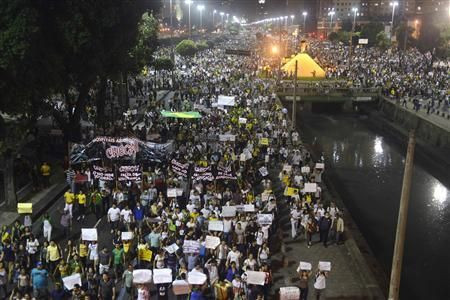Brazil’s Currency Plunges To 4-Year Low; One Million People Join Ongoing Protests

Mass protests in Brazilian cities, which have stretched on for more than a week, swelled Thursday to include an estimated one million people who thronged city streets nationwide after anti-government sentiments aimed at corruption, taxes and high inflation boiled over.
Meanwhile, Brazil’s currency, the real, plunged to a four-year low on Thursday, stoked by fears over the U.S. Federal Reserve's announcement earlier in the week that it would probably reduce its stimulus program soon and end it altogether by mid-2014. The real depreciated 1.6 percent to 2.26 against the U.S. dollar on Thursday despite interventions by the country's central bank, Reuters reported.
“Markets are going through a panic moment. The central bank, within its possibilities, is doing its job (to calm down investors) but the sentiment is pretty bad,” Glauber Romano, a trader at the Intercam brokerage in Sao Paulo, told Reuters.
President Dilma Rousseff’s government on Wednesday reversed transport fare hikes in Rio de Janeiro and Sao Paulo -- the original cause of the protests -- and promised to provide better public services, but people continued to protest in more than 100 cities on Thursday, the BBC reported, citing Brazilian media.
Rousseff canceled a trip to Japan to diffuse tensions, and has called an emergency cabinet meeting on Friday to discuss strategies to deal with the protests.
Brazil is preparing for an election next year amid an economic slowdown and and rising inflation, which has hit 6.5 percent. Foreign investors are increasingly turning away from Brazilian assets after a decade-long economic boom, which led to it being compared with other economic giants such as China and India.
In the capital, Brasilia, tens of thousands of protesters rallied around government buildings housing the Congress and the Supreme Court, while a small group of protesters briefly invaded the foreign ministry building with crude explosives, Reuters reported.
In Rio de Janeiro, where some 300,000 people took to the streets, riot police fired tear gas and rubber bullets at groups of masked men who tried to approach the City Hall building late on Thursday, injuring 29 people, the BBC reported.
In Ribeirao Preto, near Sao Paulo, a young protester died when a vehicle breached a barricade and plowed into a crowd, news reports said.
The demonstrations continue against the backdrop of the Confederations Cup -- a soccer tournament that Brazil has won thrice -- and target, among other issues, the government’s proposed budget of $26 billion for the 2014 World Cup and the 2016 Olympics.
The protesters have also denounced high taxes, rising inflation, corruption, poor infrastructure and broken public services ranging from healthcare to education.
“What am I protesting for?” Savina Santos, a 29-year-old civil servant in Sao Paulo asked Reuters. “You should ask what I'm not protesting for! We need political reform, tax reform, an end to corruption, better schools, better transportation. We are not in a position to be hosting the World Cup.”
© Copyright IBTimes 2024. All rights reserved.





















